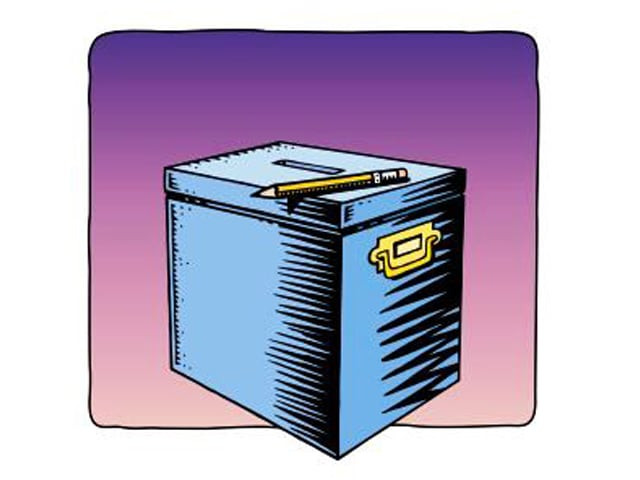Voter discrepancies: Electoral roll irregularities make AJK polls questionable
Secretary EC admits 15 per cent of entries in the voters’ list are bogus.

Abdul Rahim claims to have travelled to his native village of Chonian – in the far-flung district of Hattian Bala, some 35 kilometres uphill from Muzzafabad – from Karachi along with his family to cast a vote in the June 26 Azad Jammu and Kashmir (AJK) legislative assembly elections, only to find out that he might not be able to exercise his right of franchise.
Instead, Rahim’s son Dawood Ahmed is entered against his name in the voters’ list-2011 on the basis of which the elections are being held.
Similarly, a number of others are registered as voters against Rahim’s family members. He, in fact, claims that he can point out over 50 bogus entries in the list of his village which has less than 500 registered voters.
Abdul Rahim is not the only person deprived of this basic right. Like him, there are thousands of others in the small but disputed part of Jammu and Kashmir, making the entire electoral process questionable.
The high-ups of the state’s Election Commission (EC) have publicaly admitted that such discrepancies exist, blaming them on the revenue department staff and the local government department field staff, who had been tasked to register voters through a door-to-door campaign conducted last year.
This year, 25 political parties, including the Pakistan Peoples’ Party AJK, Muslim Conference, Pakistan Muslim League-Nawaz, MQM, Jamat-e-Islami, among others are contesting the elections.
Secretary Election Commission AJK Muhammad Younas, during an interaction with The Express Tribune, admitted that there are around 10 to 15 per cent bogus entries in the electoral lists, which, he added, was a conservative estimate.
However, locals claim that the number is much higher, with some estimating that 25 to 30 per cent of the total registered voters are either multiple entries, bogus or fake in the electoral lists.
The lists have a total number of 3,017,816 voters for 41 seats to be contested. Governed through a meek constitutional order, commonly known as the AJK interim constitution 1974, the legislative assembly of AJK has very limited powers over the law making process in the presence of a parallel but much powerful Kashmir Council, headed and controlled by the prime minister of Pakistan.
The AJK legislative assembly has a total of 49 seats, out of which 41 are directly elected through adult franchise that includes 29 in AJK and 12 refugee-based and polled in Pakistan. The remaining eight are reserved seats.
In the 29 AJK-based seats there are a total of 2,359,566 registered voters, while for the 12 refugee seats scattered throughout Pakistan there are a total of 658,250 registered voters in the newly prepared electoral rolls.
For one of the refugee seats for Kashmir Valley IV there are only 9,423 total registered voters. Among them, more than 1, 600 are bogus, according to an official involved in the electoral process.
“There is a complaint about some 7, 000 dubious votes in the two seats for Muzaffabad and its suburb. Voters with double entry can easily cast multiple votes in both constituencies since it is only a 15-minute drive between the two,” said Secretary EC Muhammad Younas.
Similar complaints were common in almost all other constituencies, with some complaining that hundreds of actual voters were missing in the constituencies, while thousands of fake entries have been made in the list.
According to the EC, it has empowered presiding officers to allow those with minor anomalies in the list to cast votes after checking identity cards.
When asked about the administrative measures to check bogus and multiple voting trend, the secretary EC said, “It will mainly depend on the polling agents of the political parties to identify and bar bogus voters from casting votes,” – a non-tangible answer that triggers fears of clashes between the political workers on polling day in the otherwise peaceful area that has more than 75 per cent literacy rate – the highest in the country.
The electorates will have to show their computerised identity cards at the time of voting. However, since there is no system to punch or mark identity cards, people with multiple entries can easily vote in as many polling stations as they want.
In the previous voters’ lists, on the basis of which 2006 elections were conducted, there were a total of 2,419,598 registered voters – 598,218 less than the voters registered in the new list.
Ironically, the total population of AJK (excluding refugees living in Pakistan), according to 1998 census, was a little over 3 million only, while the registered voters in 2006 stood at 1.8 million, and the current number of registered voters has swelled to 2.3 million – again, a question mark on the ratio of population against the number of registered voters.
Published in The Express Tribune, June 22nd, 2011.



















COMMENTS
Comments are moderated and generally will be posted if they are on-topic and not abusive.
For more information, please see our Comments FAQ